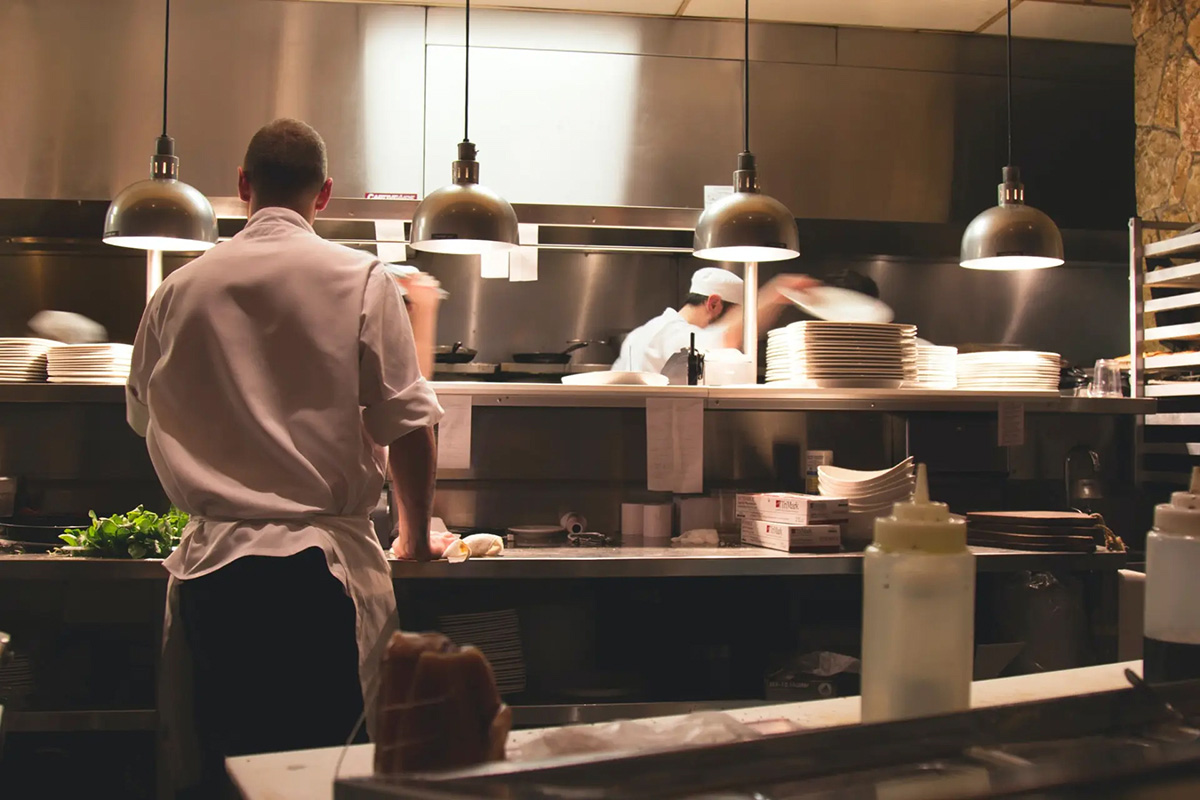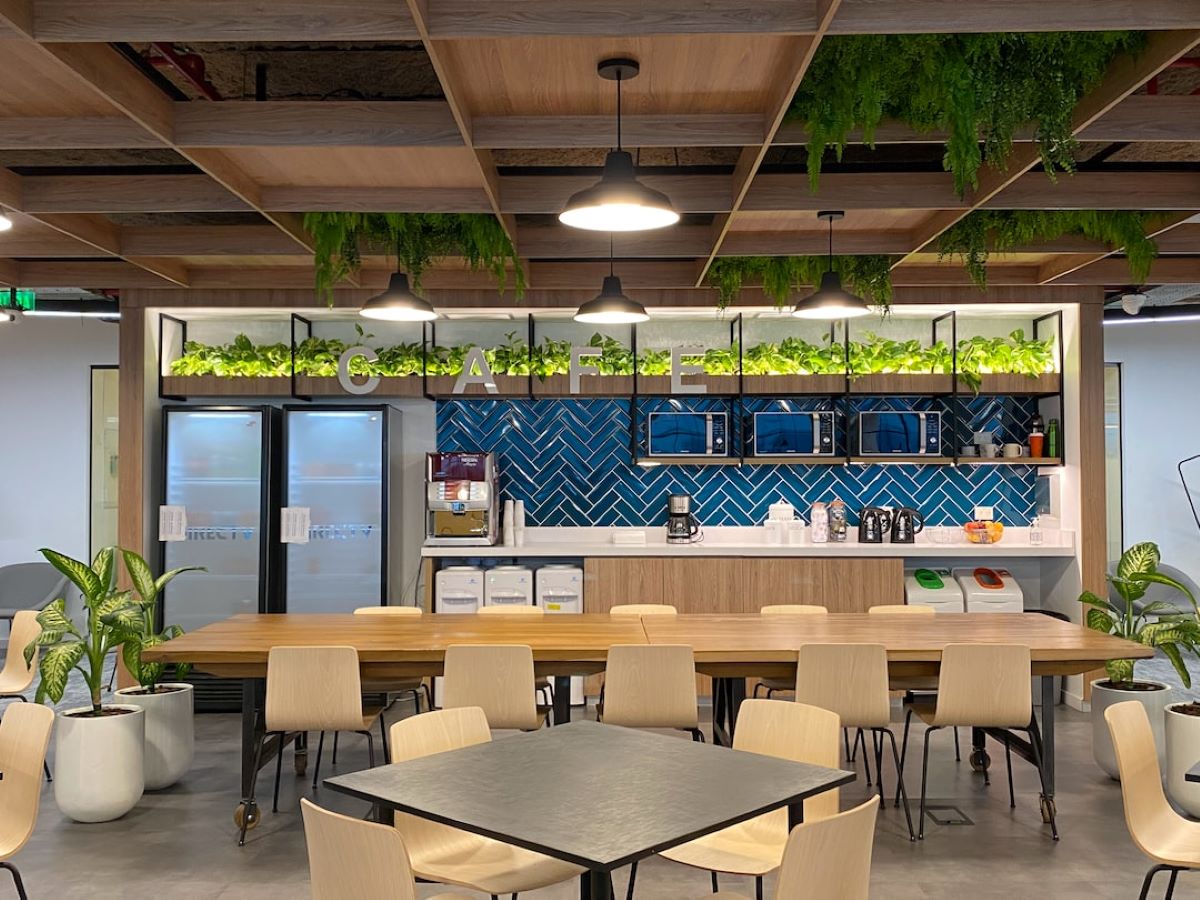

Finance
How To Get Funding For A Restaurant
Published: December 21, 2023
Looking to finance your restaurant? Discover effective strategies to get funding for your dream restaurant, and secure the capital you need to bring your culinary vision to life.
(Many of the links in this article redirect to a specific reviewed product. Your purchase of these products through affiliate links helps to generate commission for LiveWell, at no extra cost. Learn more)
Table of Contents
Introduction
Welcome to this comprehensive guide on how to get funding for a restaurant. Opening a restaurant can be an exciting venture, but it often requires a significant amount of capital to get started. Whether you are a seasoned restaurateur looking to expand your business or a passionate food lover hoping to turn your culinary dreams into reality, securing financing is a crucial step in turning your restaurant vision into a successful venture.
Obtaining funding for a restaurant can be challenging, especially in a competitive industry. However, with careful planning and a strategic approach, you can increase your chances of securing the necessary capital to launch or grow your restaurant business.
In this guide, we will walk you through the various options available for funding your restaurant, from traditional sources such as investors and loans, to alternative methods like crowdfunding and government grants. We will provide insights and tips to help you navigate the complex funding landscape, ensuring you are well-prepared to make informed decisions.
Remember, getting funding for your restaurant is not just about convincing potential investors or lenders to support your vision. It’s about crafting a compelling business plan that demonstrates your understanding of the market, your unique value proposition, and your strategy for success. Building strong relationships and showcasing your passion for the industry will go a long way in attracting the right financial partners.
So, whether you are a first-time restaurateur or an experienced entrepreneur, read on to learn how to secure the funding you need to bring your restaurant concept to life. With the right approach and a solid funding strategy, you will be one step closer to achieving your culinary aspirations and creating a thriving dining establishment.
Understanding the Funding Process
Before diving into the various funding options available, it’s important to have a clear understanding of the funding process itself. Familiarizing yourself with the steps involved will help you navigate the funding landscape more effectively:
- Evaluate your financial needs: Start by determining how much funding you will require to launch or grow your restaurant. Consider factors like location, equipment, renovations, marketing, staff, and working capital. Having a clear understanding of your financial needs will help you determine the best funding sources for your specific requirements.
- Assess your personal finances: Lenders and investors will likely assess your personal financial situation when considering your funding application. Be prepared to provide financial statements, tax returns, and credit history. If your personal finances are not in order, it may be challenging to secure funding.
- Create a solid business plan: A comprehensive business plan is essential for attracting investors and lenders. It should include information about your target market, competition, marketing strategies, financial projections, and your unique value proposition. A well-crafted business plan demonstrates your understanding of the industry and your ability to succeed.
- Identify funding sources: Once you have assessed your financial needs and prepared a solid business plan, it’s time to explore funding options. These can include traditional sources such as banks, investors, and loans, as well as alternative methods like crowdfunding and government grants.
- Review and compare funding options: Take the time to thoroughly research and evaluate each funding option. Consider factors like interest rates, repayment terms, equity requirements, and potential restrictions or limitations. Comparing funding options will help you make an informed decision that aligns with your long-term goals.
- Prepare your funding application: Each funding source will have specific requirements for their application process. Whether you’re approaching investors or applying for a small business loan, make sure to prepare all the necessary documents and present them professionally. Pay attention to details, as a well-prepared application can increase your chances of success.
- Nurture relationships: Building strong relationships with potential investors, lenders, and other financial partners is crucial. Attend industry events, network, and engage in conversations with individuals who share your passion for the restaurant business. Cultivating these relationships will not only help you secure funding but may also provide ongoing support and guidance for your restaurant venture.
By understanding the funding process and being well-prepared, you can position yourself for success when seeking funding for your restaurant. Remember, securing financing is not an overnight process, so be patient, committed, and persistent in your pursuit. With determination and a solid plan, you can turn your culinary dreams into a reality.
Creating a Business Plan
One of the key components in obtaining funding for your restaurant is having a well-crafted business plan. A business plan serves as a roadmap for your restaurant, outlining your goals, strategies, and financial projections. It not only helps you clarify your vision but also demonstrates to potential investors and lenders that you have a solid plan for success.
When creating your business plan, consider including the following elements:
- Executive summary: Provide an overview of your restaurant concept, mission statement, target market, and competitive advantage. This section should be concise yet compelling, capturing the attention of readers.
- Market analysis: Conduct thorough research on the restaurant industry and your target market. Identify your competitors, analyze consumer trends, and assess the demand for your restaurant concept. This section will help you demonstrate your understanding of the market and highlight opportunities for growth.
- Menu and concept: Describe your menu offerings and the unique aspects of your restaurant concept. Explain how your menu caters to the needs and preferences of your target market. Include details about your sourcing, food quality, and any special culinary techniques that set you apart.
- Marketing and sales strategy: Outline your marketing plan, including your target audience, branding strategy, and advertising channels. Explain how you will attract and retain customers, and provide projections on sales volume and revenue generation.
- Operational plan: Detail the day-to-day operations of your restaurant, including staffing, suppliers, inventory management, and customer service strategies. Provide information on the necessary permits, licenses, and any legal considerations specific to the restaurant industry.
- Financial projections: This section is crucial for investors and lenders. Include realistic projections for revenue, expenses, and cash flow. Detail your startup costs, ongoing costs, and potential profitability. Use industry benchmarks and historical data to support your projections.
- Management team: Highlight the experience, skills, and expertise of your management team. Include resumes or bios of key team members and explain how their qualifications contribute to the success of your restaurant.
- Risk analysis: Acknowledge potential risks and challenges that may arise in the restaurant industry. Identify strategies to mitigate these risks and demonstrate your preparedness to handle them.
Remember to keep your business plan concise, clear, and professional. Use visuals such as charts and graphs to illustrate financial projections and make the plan more engaging. Review and revise your business plan regularly to ensure it stays relevant and reflects any changes in the market or your operations.
A well-crafted business plan shows potential investors and lenders that you have carefully considered all aspects of your restaurant venture and have a solid plan for success. It gives them confidence in your ability to achieve your goals and repay any funding they provide.
Seeking Investors
One of the common ways to secure funding for your restaurant is by seeking investors who are willing to invest in your venture in exchange for a share of the profits or equity in your business. Here are some steps to consider when seeking investors:
- Identify potential investors: Start by identifying potential investors who have an interest in the restaurant industry or have invested in similar ventures before. Look for individuals or investment firms who align with your vision and values.
- Prepare a compelling pitch: Craft a compelling pitch that clearly communicates the unique aspects of your restaurant concept, its competitive advantage, and the potential for profitability. Highlight your experience and expertise in the industry, as well as any existing traction or customer interest.
- Attend networking events: Attend industry conferences, entrepreneurship events, and networking sessions to connect with potential investors. Cultivate relationships by engaging in meaningful conversations and sharing your passion for your restaurant venture.
- Utilize online platforms: Take advantage of online platforms that connect entrepreneurs with investors looking for investment opportunities. Platforms like AngelList and Gust can help you reach a wider audience of potential investors.
- Join angel investor networks: Explore angel investor networks in your area or industry. These networks consist of high-net-worth individuals who are interested in early-stage investments. Present your business plan and pitch to these networks for potential funding opportunities.
- Consider partnering with industry experts: Seek out industry experts or successful restaurateurs who may be interested in investing in your venture. Their expertise and connections can not only provide financial support but also valuable guidance and mentorship.
- Be clear on investment terms: When presenting your investment opportunity, clearly outline the terms and conditions of the investment. Be transparent about the expected return on investment, the timeline for repayment, and the level of involvement the investor will have in your business.
- Follow legal and financial regulations: It is essential to consult with legal and financial professionals when seeking investors. They can help you navigate securities laws, draft investment agreements, and ensure compliance with regulations.
Remember, seeking investors requires persistence and a strong belief in your restaurant concept. It’s important to approach potential investors with a confident and professional mindset. Be prepared to answer questions, address concerns, and provide detailed financial projections to showcase the potential return on investment.
Building a network of investors who believe in your vision can not only provide the necessary funding for your restaurant but also open doors to valuable industry connections and future growth opportunities.
Crowdfunding Options
Crowdfunding has emerged as a popular and effective way for entrepreneurs to raise funds for their restaurant ventures. It allows individuals to pool small amounts of money from a large number of people, often through online platforms. Here are some crowdfunding options to consider when seeking funding for your restaurant:
- Reward-based crowdfunding: Platforms like Kickstarter and Indiegogo allow entrepreneurs to offer rewards or incentives in exchange for monetary contributions. For example, you can offer exclusive dining experiences, merchandise, or special discounts to backers who support your restaurant project. It’s important to create compelling rewards that align with your restaurant concept and resonate with potential backers.
- Equity crowdfunding: Equity crowdfunding platforms such as SeedInvest and StartEngine allow individuals to invest money in exchange for a percentage of equity in your business. This option gives backers a financial stake and the potential for returns if your restaurant succeeds. Before pursuing equity crowdfunding, make sure to research and comply with the legal requirements and regulations in your jurisdiction.
- Community crowdfunding: Another crowdfunding option is to leverage your local community’s support. Engage with your community through social media, local events, or local business associations, and seek their contributions to fund your restaurant. Highlight the benefits your restaurant will bring to the community, such as job creation or supporting local suppliers, to encourage community involvement.
- Restaurant-specific crowdfunding platforms: There are crowdfunding platforms specifically designed for the restaurant industry, such as FoodStart and LocalStake. These platforms cater to food and beverage entrepreneurs and can connect you with individuals who have a specific interest in supporting restaurant projects.
- Prepare a compelling crowdfunding campaign: To succeed in crowdfunding, you need to create an enticing campaign that effectively communicates your vision and captures the attention of potential backers. Craft a compelling story about your restaurant concept, highlight the unique aspects that set it apart, and explain how the funds raised will be utilized to bring your vision to life. Utilize engaging visuals, videos, and social media to amplify your campaign’s reach.
- Engage with your backers: When running a crowdfunding campaign, it’s crucial to actively engage with your backers. Respond to comments, provide regular updates on the progress of your project, and express gratitude for their support. Building a sense of community and involving backers in the journey can foster long-term relationships and future support.
Crowdfunding allows you to not only raise funds for your restaurant but also build a dedicated community of supporters who believe in your concept. However, it’s important to note that a successful crowdfunding campaign requires strategic planning, strong storytelling, and active engagement with potential backers.
Ensure you fully understand the terms and conditions of the crowdfunding platform you choose, and carefully consider your rewards or equity offerings. With an appealing campaign and a compelling story, you can tap into the power of the crowd to finance your restaurant dreams.
Small Business Loans
If you’re looking for a more traditional financing option, small business loans can provide the necessary capital to start or expand your restaurant. Here are some key points to consider when exploring small business loans:
- Research loan options: Start by researching different types of small business loans available to you. Options may include traditional bank loans, Small Business Administration (SBA) loans, or loans from alternative lenders. Compare interest rates, repayment terms, and eligibility requirements to find the best loan option for your restaurant.
- Prepare your loan application: Before applying for a small business loan, gather all the necessary documentation and information required by the lender. This typically includes your business plan, financial statements, tax returns, and personal financial information. Be prepared to provide collateral if necessary.
- Establish a strong credit profile: Lenders will evaluate your creditworthiness when considering your loan application. Make sure your personal and business credit profiles are in good standing. Pay off outstanding debts and resolve any credit issues before applying for a loan.
- Consider SBA loans: The Small Business Administration offers loan programs specifically designed to support small businesses. SBA loans often have favorable terms and lower interest rates compared to traditional bank loans. However, the application process may be more stringent.
- Build a relationship with lenders: Establishing a relationship with banks and lenders before applying for a loan can increase your chances of approval. Attend local networking events, engage with lenders, and consider opening a business bank account to demonstrate your commitment and financial stability.
- Prepare a comprehensive loan proposal: A well-prepared loan proposal is crucial to successfully obtaining a small business loan. It should provide an overview of your restaurant concept, financial projections, and a repayment plan. Convince lenders that your business is a viable investment and that you have a solid plan for repayment.
- Consider alternative lenders: If traditional bank loans are not feasible, explore options such as online lenders or community development financial institutions (CDFIs). These lenders may have less stringent requirements and can provide flexible financing options for your restaurant.
- Review loan terms and conditions: Before accepting a loan offer, carefully review the terms and conditions. Pay close attention to interest rates, repayment schedules, and any potential fees or penalties. Ensure that the loan aligns with your financial goals and feasibility.
- Seek professional advice: Consulting with a financial advisor or small business consultant can provide valuable insights and guidance during the loan application process. They can help you understand the various loan options available and assist in preparing a strong loan application.
Remember, obtaining a small business loan requires careful planning, diligent preparation, and a solid understanding of your financial needs. Be prepared to demonstrate your restaurant’s profitability and the ability to repay the loan to increase your chances of approval. With the right loan and financial management, you can leverage small business loans to fuel the growth and success of your restaurant.
Government Grants and Programs
In addition to traditional loans and crowdfunding, government grants and programs can provide valuable financial support to help fund your restaurant venture. Here are some key points to consider when exploring government grants and programs:
- Research available grants and programs: Begin by researching grants and programs offered by government agencies at different levels, such as local, state, or federal. Look for grants specific to the restaurant industry or those that support small businesses and entrepreneurial ventures.
- Determine eligibility: Each grant program will have specific eligibility criteria. Ensure you meet the requirements before applying. Eligibility may be based on factors such as your business type, location, market segment, or your ability to create jobs or support economic development.
- Prepare a strong grant proposal: Crafting a compelling grant proposal is crucial to stand out from the competition. Clearly demonstrate how your restaurant aligns with the goals and objectives of the grant program. Include details about your business concept, market analysis, financial projections, and the potential impact your restaurant will have on the local economy.
- Work with small business development centers: Small Business Development Centers (SBDCs) are valuable resources that provide free or low-cost assistance to small businesses. They can help you identify relevant grant programs, review your grant proposal, and provide guidance throughout the application process.
- Stay updated with application deadlines: Government grant programs often have specified application deadlines. Stay informed about these deadlines and ensure you submit your application on time. Late submissions are typically not accepted.
- Be prepared for a competitive process: Government grants can be highly competitive due to the limited funding available. Be prepared for a thorough evaluation process, which may include multiple stages, such as initial screening, interviews, or presentations. Make sure your grant proposal showcases your uniqueness and the value your restaurant brings to the community or the industry.
- Explore tax incentives: In addition to grants, governments may offer tax incentives or credits for businesses, including restaurants. Research tax schemes specific to your location and industry to identify potential savings or incentives that can contribute to your financial stability.
- Follow reporting requirements: If you are awarded a government grant, it’s important to understand and comply with the reporting requirements. Government agencies typically require periodic progress reports, financial statements, or other documentation to ensure the allocated funds are being used appropriately.
- Stay informed about changes and updates: Government grants and programs may change or evolve over time. Stay informed by subscribing to relevant newsletters, attending industry events, or regularly checking government websites to ensure you are aware of any new funding opportunities or policy updates.
Government grants and programs can provide significant financial support for your restaurant venture. However, securing a grant can be a competitive and time-consuming process. Be sure to invest time and effort in preparing a strong grant proposal and seek assistance from professionals or advisors to increase your chances of success. By leveraging government grants, you can obtain the necessary funding to bring your restaurant vision to life while contributing to the local economy.
Approaching Banks and Financial Institutions
Banks and financial institutions are traditional sources of funding for businesses, including restaurants. Here’s what you need to know when approaching banks and financial institutions for a loan:
- Research and choose the right institution: Research different banks and financial institutions to find the ones that offer small business loans and have experience in the restaurant industry. Look for institutions that are known for their favorable loan terms, interest rates, and customer service.
- Prepare a comprehensive loan application: Banks require a thorough loan application to assess your creditworthiness and the viability of your restaurant. Prepare financial statements, tax returns, a business plan, and any other documentation required by the institution. Ensure your application is well-organized and presents a compelling case for funding.
- Built a strong relationship: Building a relationship with the bank or financial institution before applying for a loan can significantly improve your chances of approval. Open a business bank account, establish regular communication, and seek guidance from banking representatives. A trusted relationship can enhance their confidence in your ability to repay the loan.
- Highlight your creditworthiness: Banks will closely examine your personal and business credit history when considering your loan application. Ensure that you have maintained a good credit score and resolve any outstanding debt issues before applying. Providing evidence of strong financial management will increase your credibility.
- Prepare a backup plan: Banks may require collateral or a personal guarantee as a security for the loan. Prepare a backup plan in case you are requested to provide additional guarantees or assets to support your loan application. This could include personal assets or alternative sources of collateral.
- Emphasize the profitability of your restaurant: Banks want assurance that your restaurant will generate enough revenue to cover loan repayments. Highlight the profitability of your restaurant through comprehensive financial projections, demonstrating your ability to generate consistent cash flow and meet repayment obligations.
- Be prepared for negotiation: Terms and conditions for small business loans can be negotiable. Take the time to understand the proposed loan terms and negotiate for more favorable interest rates, repayment plans, or loan amounts. Be prepared to discuss your business projections and offer a compelling case for why you deserve better terms.
- Explore specialized loan programs: Some banks offer specialized loan programs for restaurants, such as loans specifically tailored for equipment purchases or restaurant expansions. Research and inquire about these specialized programs as they may offer more favorable terms or industry-specific support.
Remember that banks and financial institutions have strict lending criteria, making it crucial to approach them well-prepared. Showcasing your financial stability, your restaurant’s profitability, and your ability to repay the loan will increase your chances of securing funding from these traditional sources.
Partnering with Restaurant Franchise
Partnering with a restaurant franchise can be an excellent option for aspiring restaurant owners who want to leverage an established brand and business model. Here are some key points to consider when exploring a partnership with a restaurant franchise:
- Research and choose the right franchise: Take the time to research and evaluate different restaurant franchises to find the one that aligns with your interests, goals, and financial capabilities. Consider factors such as brand reputation, support provided by the franchisor, franchise fees, and the potential for growth in your target market.
- Evaluate the franchise agreement: Carefully review the franchise agreement, which outlines the rights, responsibilities, and obligations of both parties. Seek legal advice to ensure you understand the terms, including the initial franchise fee, ongoing royalty fees, marketing contributions, and any limitations or restrictions imposed by the franchisor.
- Assess the support and training provided: Franchisors typically offer support and training to their franchisees. Evaluate the resources provided, such as initial training programs, ongoing operational support, marketing assistance, and access to a network of franchisees. The level of support will significantly impact your chances of success as a franchisee.
- Consider financial requirements: Franchises often require a significant upfront investment, including franchise fees, equipment costs, and initial inventory purchases. Assess your financial capabilities and ensure you have sufficient funding to cover both the initial investment and the ongoing operation costs.
- Understand the brand guidelines and standards: Franchise agreements come with strict brand guidelines and operational standards that must be followed. This includes adherence to menu offerings, service protocols, store design, and marketing strategies. Ensure that you are comfortable with these guidelines and committed to maintaining the brand identity and quality standards.
- Tap into an established customer base: One of the main benefits of partnering with a franchise is the instant brand recognition and an existing customer base. Capitalize on the loyal customer following and leverage the marketing efforts of the franchisor to attract customers to your restaurant.
- Benefit from collective purchasing power: Franchises often have agreements with suppliers, allowing franchisees to benefit from bulk purchasing and cost savings. This can help reduce operational costs and improve profit margins for your restaurant.
- Balance franchise requirements with your entrepreneurial vision: While partnering with a franchise offers a proven business model, it’s important to consider how much creative control you desire. Franchises typically have guidelines that must be followed, limiting your freedom to make certain decisions. Find a balance between following the franchise system and infusing your own entrepreneurial vision.
Partnering with a restaurant franchise can offer a shortcut to success in the highly competitive restaurant industry. However, it’s important to thoroughly research, evaluate, and align yourself with a franchise that matches your goals and values. By leveraging the support, brand recognition, and proven operational systems of a franchise, you can increase your chances of running a successful restaurant venture.
Conclusion
Securing funding for a restaurant can be a challenging but essential step in turning your culinary dreams into a successful reality. Whether you choose to seek investors, explore crowdfunding options, apply for small business loans, tap into government grants, or partner with a franchise, each funding avenue comes with its own set of advantages and considerations.
While the process of obtaining funding may be daunting, it is crucial to approach it with careful planning, a well-crafted business plan, and a relentless pursuit of your goals. Researching your options, understanding the requirements, and preparing compelling proposals will greatly increase your chances of success.
Remember, funding is not just about securing the necessary capital for your restaurant; it’s about building relationships, demonstrating your expertise, and showcasing your passion and dedication to the industry. Whether you’re pitching to investors, launching a crowdfunding campaign, or applying for a loan, you need to present a compelling story that resonates with potential backers.
Additionally, continuous learning and staying informed about industry trends, regulations, and funding opportunities are key to staying competitive and maximizing your chances of securing funding. Seek guidance from professionals, attend industry events, and leverage the resources available to you, such as small business centers or networking communities.
Ultimately, successfully funding your restaurant requires a combination of financial acumen, industry knowledge, and entrepreneurial spirit. By leveraging the various funding options available and approaching them strategically, you can navigate the funding landscape with confidence and bring your restaurant vision to life.
So, dream big, plan carefully, and embrace the exciting journey of securing funding for your restaurant. With determination, perseverance, and a solid funding strategy, you can turn your culinary aspirations into a thriving restaurant business that delights customers and brings your unique flavors to the world.














